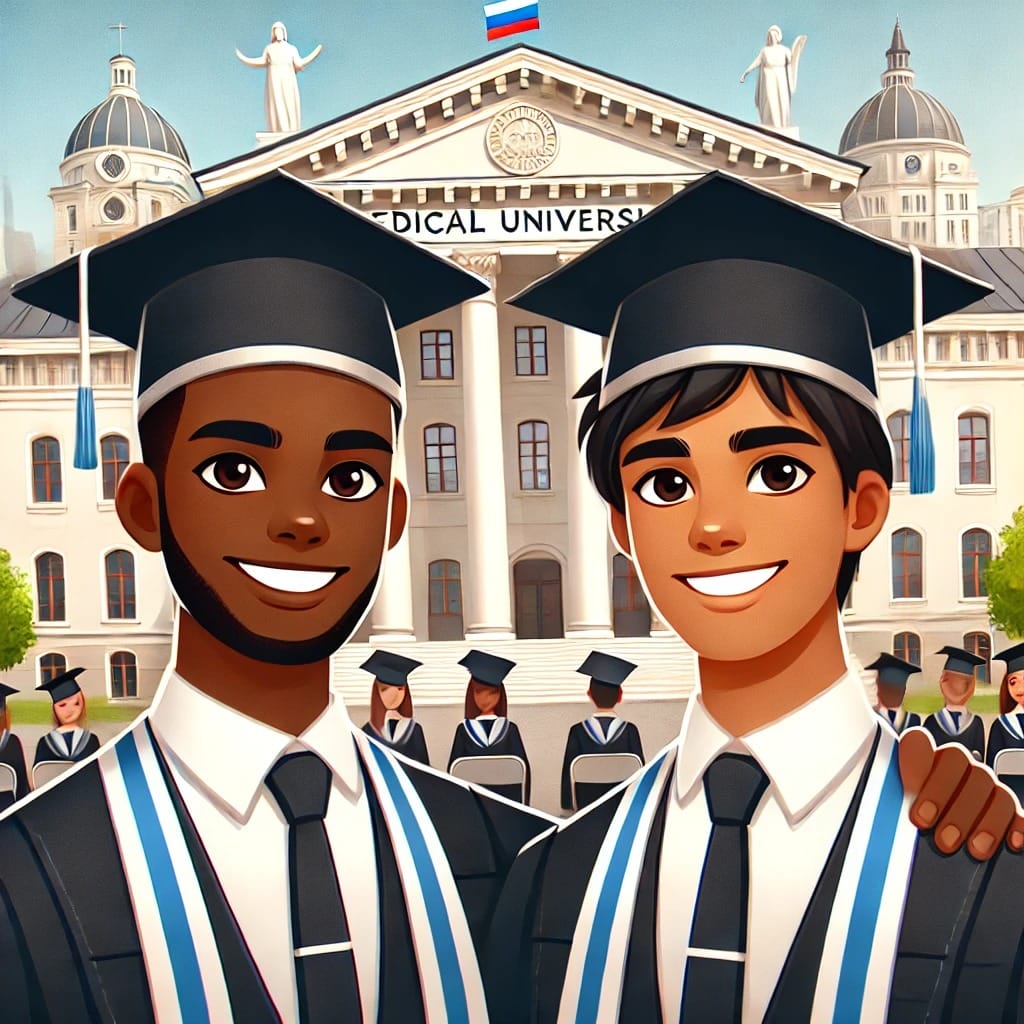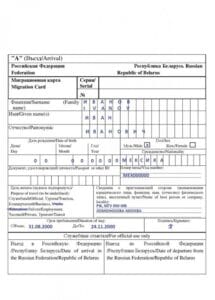How to Study Medicine in Russia: A Student’s Experience”. Studying in Russia is an exciting opportunity, but it comes with its unique challenges and nuances. Russia is one of the largest destinations for international students, with over 300,000 international students enrolled in its universities annually. Renowned for its strong emphasis on science, engineering, and medical fields, Russian universities rank among the best globally in specific disciplines.
Russia offers an unparalleled cultural and academic experience. Students are immersed in a blend of traditional Russian heritage and modern global perspectives. Moscow and Saint Petersburg host many of the country’s top universities, but smaller cities also provide high-quality education with a more localized experience. Additionally, the cost of education and living in Russia is often significantly lower compared to Western countries, making it an attractive destination for students from diverse backgrounds.
For prospective students, understanding the realities of studying in Russia—beyond the glossy brochures and agency pitches—is crucial. As a final-year medical student who has been in Russia since 2015, I’ve gathered first-hand insights to help potential and current students navigate their journey. This guide is designed to answer the most common questions, provide actionable advice, and debunk myths about studying and living in Russia.
By equipping yourself with the right information, you can make informed decisions and maximize your experience in this diverse and vibrant country.
1. Fees and Associated Costs
Tuition Fees
Tuition fees in Russia vary widely depending on the university and program. Here’s a detailed breakdown:
- Range: $2,500 – $15,000 per year
- Factors Influencing Fees:
- Type of program (e.g., medicine, engineering, humanities)
- Medium of instruction (English-medium programs often cost more)
- University ranking and location
Additional Costs
In addition to tuition fees, students should budget for:
- Accommodation Fees: $50-$200/month (depending on location and housing type)
- Health Insurance: $100-$200/year
- Miscellaneous Costs: Books, lab fees, and personal expenses
Application Fees
Most universities require a non-refundable application fee:
- Range: $200 – $500
Tip: Keep receipts and ensure the payment process is official to avoid fraud.
2. How to Apply
Step-by-Step Application Process
- Research Universities:
- Use platforms like Study in Russia to explore options.
- Compare programs, fees, and admission requirements.
- Prepare Required Documents:
- Passport (valid for at least 18 months)
- Transcripts and certificates (legalized and translated into Russian)
- Medical certificates, including HIV test results
- Apply Online or Through Agencies:
- Apply directly via the university’s website or use accredited agencies.
- Pay the Application Fee:
- Confirm payment methods with the university to ensure security.
- Await Confirmation:
- Universities typically respond within 2-4 weeks with an acceptance letter.
Tip: Start the application process 6-8 months before your planned start date to account for delays.
“5 Steps to Secure Admission into Russian Universities.”
3. Acceptance Letter
The acceptance letter is a critical step in confirming your place at a Russian university. Once received, ensure it includes:
- Full name and passport details
- Program details (duration, start date, and tuition fees)
- Contact information for further queries
Common Issues with Acceptance Letters
- Delays due to incomplete documentation
- Errors in personal or program details
Tip: Contact the admissions office immediately to correct any mistakes.
4. Invitation Letter: Timeline and Importance
Once your acceptance is confirmed, the university will issue an invitation letter, which is required for the visa application process.
Timeline:
- Processing Time: 4-6 weeks (depending on the season)
Pro Tip: Track your application status regularly to avoid missing deadlines.
5. Visa Application
Steps to Apply for a Student Visa
- Obtain your invitation letter.
- Fill out the student visa application form.
- Provide necessary documents:
- Valid passport
- Recent photographs
- Invitation letter
- Proof of payment of the visa fee
- Submit your application at the Russian Embassy or Consulate in your country.
- Wait for processing, which usually takes 10-20 business days.
Note: The initial visa is valid for 90 days and must be extended upon arrival in Russia.
Tip: Avoid last-minute applications as processing delays are common.
Read Also “Comprehensive Guide to Russian Student Visas.”
6. Required Documents
To complete your application and entry into Russia, ensure you have:
- Passport (valid for at least 18 months)
- Academic transcripts and certificates
- Birth certificate
- Medical certificate (including HIV test)
- Passport-sized photographs
Important: Ensure all documents are legalized and translated into Russian. How to Study Medicine in Russia: A Student’s Experience”
7. Legalization and Translation of Documents
Legalization Process
- Notarize the documents in your home country.
- Obtain Apostille certification if required by your country’s agreement with Russia.
Translation Process
- Hire certified translators.
- Submit translated documents to the university and visa authorities.
Read Also: “Step-by-Step Guide to Document Legalization for Russian Universities.”
8. Immigration Rules and Staying Safe
Visa Extensions
Once you arrive in Russia, you must extend your visa beyond the initial 90-day period. Follow these steps:
- Registration:
- Register your residence with the local migration office within 7 days of arrival.
- Renew your registration every time you change your address.
- Apply for a Multi-Entry Visa:
- Your university will help you apply for this after the initial visa expires.
Key Immigration Rules
- Always carry your passport, migration card, and registration slip.
- Avoid overstaying your visa—penalties include fines, deportation, or re-entry bans.
Migration Card
You will receive a migration card upon entry. Keep this safe as it is necessary for registration and visa renewals.
Tip: Familiarize yourself with the local migration office procedures to avoid complications.
9. Cost of Living in Russia
Monthly Expenses
- Accommodation: $50-$200 (dormitories) or $200-$400 (apartments)
- Food: $50-$100
- Transport: $10-$20
- Miscellaneous: $20-$50
Budgeting Tips
- Cook meals at home to save money.
- Use public transport or student discounts for travel.
- Buy second-hand books or use library resources.
10. Skills That Can Help You Find Jobs
While studying, part-time work can supplement your income. Develop the following skills:
- Barbering: A highly sought-after service among students.
- Physical Labor: Seasonal work opportunities, especially in construction.
- Online Sales: Sell products or offer services on platforms like Avito or VKontakte.
- Language Tutoring: Teaching English or another language to locals can be lucrative.
Tip: Balance your job and studies to maintain academic performance. How to Study Medicine in Russia: A Student’s Experience”
Read Also: “Top 8 Part-Time Jobs for Students in Russia.”
11. Jobs After Graduation
Russia allows international graduates to stay for six months to find employment. Here are key industries:
- Healthcare: Doctors, nurses, and medical researchers are in demand.
- IT and Technology: Programmers and software developers.
- Education: English tutors and language teachers.
Tip: Start building a network during your studies to secure job opportunities.
12. Starting a Business in Russia or Ghana
Opportunities
- Import/export businesses connecting Russia and Ghana.
- Healthcare startups leveraging medical expertise.
Challenges
- Understanding local regulations.
- Navigating language barriers.
Read Also: “How to Start a Business as a Graduate in Russia.”
13. Health and Insurance for International Students
- What kind of medical insurance do international students need in Russia? International students are required to have health insurance, which is either provided by their university or purchased independently. Most universities offer a compulsory insurance plan, but you may also choose private insurance to cover a wider range of services. Make sure the insurance includes emergency care, routine doctor visits, and hospital stays.
- Is healthcare affordable for students in Russia? Healthcare in Russia is relatively affordable compared to Western countries, but the cost depends on the type of treatment. Public healthcare is inexpensive for those with insurance, but private healthcare can be costly. Many students find it more cost-effective to use the public healthcare system.
- Are there student-friendly clinics or hospitals? Yes, there are clinics and hospitals that cater to students. Universities typically have agreements with local healthcare providers, offering discounted or prioritized services for students. Additionally, major cities like Moscow and St. Petersburg have private student-friendly clinics offering English-speaking staff. How to Study Medicine in Russia: A Student’s Experience”
14. Housing and Accommodation
- What are the pros and cons of living in university dormitories versus private apartments?
- Dormitories:
- Pros: Affordable, convenient, often close to campus, includes utilities.
- Cons: Less privacy, limited space, shared facilities.
- Private Apartments:
- Pros: More privacy, freedom to personalize your space, potentially larger.
- Cons: Higher cost, additional responsibilities (maintenance, utility bills), potential language barriers with landlords.
2. How do I find affordable accommodation in Russia? You can find affordable accommodation by searching online platforms like Avito, Domofond, or Yandex. University dormitories are the most budget-friendly option, but private rentals are available at varying price points depending on the location and size.
3. Is it easy to switch housing during the academic year? Switching housing can be challenging, especially during the academic year. If you’re in a dormitory, moving out may require approval from the university, and rental agreements for private apartments typically last for at least six months. However, there are flexible options if you act early.
15. Banking and Financial Tips
- How do international students open a bank account in Russia? To open a bank account, you’ll need your passport, student visa, and university enrollment confirmation. Some banks, like Sberbank and Tinkoff, offer accounts tailored for international students. You may also need to show proof of income or your financial standing.
- Are there international-friendly banks in Russia? Yes, banks like Sberbank, VTB, and Tinkoff are popular among international students. They offer services in English and allow international transfers. Some banks may also offer student discounts or fee waivers for students.
- How do students send money to and from Russia? Students can use international money transfer services like Western Union, TransferWise (Wise), or PayPal. Many students also use bank transfers, but this can be slow and expensive. Online services tend to be faster and cheaper, especially for smaller amounts.
16. Cultural Adjustments and Lifestyle
- What cultural differences should international students prepare for? Russians may appear reserved at first, but they are generally friendly once you get to know them. Understanding the importance of punctuality, formality in language (especially in academic settings), and direct communication can help you adapt to Russian culture. Personal space can also be different from what you might be used to, so be prepared for occasional closer proximity in public.
- How do Russian holidays and traditions impact student life? Russian holidays, such as New Year’s Eve, Russian Orthodox Christmas (January 7), and International Women’s Day (March 8), are significant and often celebrated with family gatherings, festivities, and time off from school. University schedules may be adjusted during these periods, and some businesses may close for national holidays.
17. What foods should international students try or avoid in Russia?
- Must-try foods: Borscht (beet soup), pelmeni (dumplings), blini (pancakes), and shchi (cabbage soup) are traditional Russian dishes.
- Foods to be cautious about: The portion sizes in some dishes can be large, and certain local ingredients (like fermented vegetables) might be unfamiliar or have an acquired taste.
18. Networking and Community Building
- Are there clubs, associations, or organizations for international students in Russia? Most Russian universities have student associations or clubs specifically for international students. These clubs help students from different countries connect, organize events, and provide support. Additionally, many universities have cultural exchange programs.
- How can students connect with other expats? Expat communities in Russia are well-established, and there are numerous online forums and social media groups where students can meet others. Websites like Meetup.com also offer events and activities for expats. Attending international student events is another great way to meet fellow expats.
- Are there mentorship opportunities available for newcomers? Many universities offer mentorship programs where senior students help newcomers adjust to life in Russia. These programs may involve academic guidance or help with practical matters like navigating the city and understanding Russian customs.
19. Transport and Mobility
- How reliable is public transport in Russian cities? Public transportation in major Russian cities, such as Moscow and St. Petersburg, is reliable and extensive. The metro systems are fast and affordable, and buses, trams, and trolleybuses provide good coverage throughout cities.
- What are the best ways to commute between university and housing? The metro is the fastest and most efficient way to travel between university and housing in most major cities. Bus and tram networks can be useful but may be slower during peak hours.
- Do students get discounts on transportation? Yes, many cities offer discounts for students, particularly for public transport. A student metro card or transport pass is available in cities like Moscow and St. Petersburg, allowing for discounted travel.
20. Study Resources and Support
- Are there libraries or study spaces available for international students? Most universities in Russia have libraries with study spaces. Some libraries offer services in English or have sections dedicated to international students. Additionally, university campuses usually have dedicated study areas and Wi-Fi.
- What online resources can help with learning Russian or studying in Russian? There are numerous online platforms to learn Russian, including Duolingo, Babbel, and RussianPod101. Many universities offer Russian language courses, and YouTube is full of helpful tutorials. For academic study, websites like Academic.ru and Google Scholar can be invaluable.
- How accessible are professors and tutors for academic support? Professors are generally accessible during office hours or by appointment. Many universities also offer tutoring services for international students. It’s a good idea to approach professors early if you need assistance with coursework.
21. Climate and Weather Preparation
- How do students prepare for the harsh Russian winters? Students should invest in high-quality winter clothing, including thermal jackets, boots, gloves, and hats. It’s also important to have layers for warmth. Many students find it helpful to learn about local indoor heating systems, which can be quite strong, to adjust accordingly.
- What clothing and supplies should be brought from home? Bring warm clothes suitable for freezing temperatures. If possible, pack layers for warmth and moisture-wicking clothes to manage the cold. A good umbrella and waterproof clothing will be helpful in winter months when there’s a lot of snow and slush.
- How do students cope with seasonal depression or homesickness? Seasonal affective disorder (SAD) can be a concern due to long winters and limited daylight. Students can combat this by staying active, participating in social activities, and seeking sunlight when possible. Talking to friends or joining support groups can also help manage homesickness.
22. Legal Rights and Protections
- What legal rights do international students have in Russia? International students have the right to access healthcare, legal protections against discrimination, and the ability to work within limits set by their student visa. Make sure you register with the Federal Migration Service to stay within the law.
- How can students handle issues with landlords or employers? If issues arise, students should first try to resolve them directly. If that’s unsuccessful, they can seek help from the university’s legal department or local legal resources. Russian law provides protections for tenants and workers.
- What should students do if they face discrimination? Students who face discrimination should report it to their university administration or contact local human rights organizations for support. Universities often have protocols in place to address such issues.
23. Extracurricular and Social Activities
- What activities can students do outside of academics? Students can participate in sports, join cultural clubs, attend university-hosted events, or volunteer. Russia offers a wide range of activities, from hiking in the countryside to exploring local museums and theaters.
- Are there sports facilities, gyms, or recreational options for students? Most universities have sports facilities or agreements with local gyms that offer discounted memberships for students. There are also outdoor spaces for sports like football, basketball, and tennis.
- What are some must-visit places in Russia during breaks? Top destinations include Moscow’s Red Square, St. Petersburg’s Hermitage Museum, Lake Baikal, and the Trans-Siberian Railway. Students can take advantage of university holidays to explore Russia’s rich history and stunning natural landscapes.
24. . In Conclusion
Studying in Russia offers a wealth of opportunities, but preparation is key. By following the steps and tips outlined in this guide, you can navigate the process smoothly and make the most of your experience. Always stay informed about updates to laws and policies to ensure compliance. How to Study Medicine in Russia: A Student’s Experience”
“Have questions or need further guidance? Comment below or reach out for personalized advice!”





